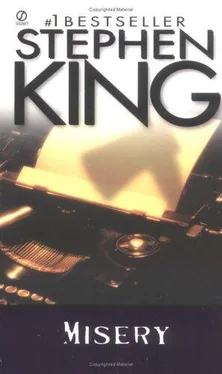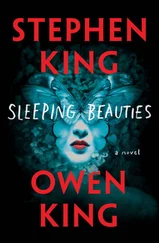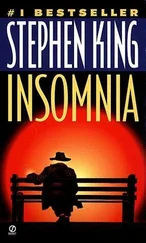Stephen King - Misery
Здесь есть возможность читать онлайн «Stephen King - Misery» весь текст электронной книги совершенно бесплатно (целиком полную версию без сокращений). В некоторых случаях можно слушать аудио, скачать через торрент в формате fb2 и присутствует краткое содержание. Год выпуска: 1988, Жанр: Ужасы и Мистика, на английском языке. Описание произведения, (предисловие) а так же отзывы посетителей доступны на портале библиотеки ЛибКат.
- Название:Misery
- Автор:
- Жанр:
- Год:1988
- ISBN:нет данных
- Рейтинг книги:3 / 5. Голосов: 2
-
Избранное:Добавить в избранное
- Отзывы:
-
Ваша оценка:
- 60
- 1
- 2
- 3
- 4
- 5
Misery: краткое содержание, описание и аннотация
Предлагаем к чтению аннотацию, описание, краткое содержание или предисловие (зависит от того, что написал сам автор книги «Misery»). Если вы не нашли необходимую информацию о книге — напишите в комментариях, мы постараемся отыскать её.
Misery — читать онлайн бесплатно полную книгу (весь текст) целиком
Ниже представлен текст книги, разбитый по страницам. Система сохранения места последней прочитанной страницы, позволяет с удобством читать онлайн бесплатно книгу «Misery», без необходимости каждый раз заново искать на чём Вы остановились. Поставьте закладку, и сможете в любой момент перейти на страницу, на которой закончили чтение.
Интервал:
Закладка:
These things all came at widely spaced intervals, but then as the pain itself began not to recede but to erode (as that Revere Beach piling must itself have eroded, he thought, because nothing is forever - although the child he had been would have scoffed at such heresy), outside things began to impinge more rapidly until the objective world, with all its freight of memory, experience, and prejudice, had pretty much re-established itself. He was Paul Sheldon, who wrote novels of two kinds, good ones and best-sellers. He had been married and divorced twice. He smoked too much (or had before all this, whatever “all this” was). Something very bad had happened to him but he was still alive. That dark-gray cloud began to dissipate faster and faster. It would be yet awhile before his number-one fan brought him the old clacking Royal with the grinning gapped mouth and the Ducky Daddles voice, but Paul understood long before then that he was in a hell of a jam.
4
That prescient part of his mind saw her before he knew he was seeing her, and must surely have understood her before he knew he was understanding her - why else did he associate such dour, ominous images with her? Whenever she came into the room he thought of the graven images worshipped by superstitious African tribes in the novels of H. Rider Haggard, and stones, and doom.
The image of Annie Wilkes as an African idol out of She or King Solomon's Mines was both ludicrous and queerly apt. She was a big woman who, other than the large but unwelconiing swell of her bosom under the gray cardigan sweater she always wore, seemed to have no feminine curves at all - there was no defined roundness of hip or buttock or even calf below the endless succession of wool skirts she wore in the house (she retired to her unseen bedroom to put on jeans before doing her outside chores). Her body was big but not generous. There was a feeling about her of clots and roadblocks rather than welcoming orifices or even open spaces, areas of hiatus.
Most of all she gave him a disturbing sense of solidity, as if she might not have any blood vessels or even internal organs; as if she might be only solid Annie Wilkes from side to side and top to bottom. He felt more and more convinced that her eyes, which appeared to move, were actually just painted on, and they moved no more than the eyes of portraits which appear to follow you to wherever you move in the room where they hang. It seemed to him that if he made the first two fingers of his hand into a V and attempted to poke them up her nostrils, they might go less than an eighth of an inch before encountering a solid (if slightly yielding) obstruction; that even her gray cardigan and frumpy house skirts and faded outside-work jeans were part of that solid fibrous unchannelled body. So his feeling that she was like an idol in a perfervid novel was not really surprising at all. Like an idol, she gave only one thing: a feeling of unease deepening steadily toward terror. Like an idol, she took everything else.
No, wait, that wasn't quite fair. She did give something else. She gave him the pills that brought the tide in over the pilings.
The pills were the tide; Annie Wilkes was the lunar presence which pulled them into his mouth like jetsam on a wave. She brought him two every six hours, first announcing her presence only as a pair of fingers poking into his mouth (and soon enough he learned to suck eagerly at those poking fingers in spite of the bitter taste), later appearing in her cardigan sweater and one of her half-dozen skirts, usually with a paperback copy of one of his novels tucked under her arm. At night she appeared to him in a fuzzy pink robe, her face shiny with some sort of cream (he could have named the main ingredient easily enough even though he had never seen the bottle from which she tipped it; the sheepy smell of the lanolin was strong and proclamatory), shaking him out of his frowzy, dream-thick sleep with the pills nestled in her hand and the poxy moon nestled in the window over one of her solid shoulders.
After awhile - after his alarm had become too great to be ignored - he was able to find out what she was feeding him. It was a pain-killer with a heavy codeine base called Novril. The reason she had to bring him the bedpan so infrequently was not only because he was on a diet consisting entirely of liquids and gelatines (earlier, when he was in the cloud, she had fed him intravenously), but also because Novril had a tendency to cause constipation in patients taking it. Another side-effect, a rather more serious one, was respiratory depression in sensitive patients. Paul was not particularly sensitive, even though he had been a heavy smoker for nearly eighteen years, but his breathing had stopped nonetheless on at least one occasion (there might have been others, in the haze, that he did not remember). That was the time she gave him mouth-to-mouth. It might have just been one of those things which happened, but he later came to suspect she had nearly killed him with an accidental overdose. She didn't know as much about what she was doing as she believed she did. That was only one of the things about Annie that scared him.
He discovered three things almost simultaneously, about ten days after having emerged from the dark cloud. The first was that Annie Wilkes had a great deal of Novril (she had in fact, a great many drugs of all kinds). The second was that he was hooked on Novril. The third was that Annie Wilkes was dangerously crazy.
5
The darkness had prologued the pain and the storm-cloud; he began to remember what had prologued the darkness as she told him what had happened to him. This was shortly, after he had asked the traditional when-the-sleeper-wakes question and she had told him he was in the little town of Sidewinder, Colorado. In addition she told him that she had read each of his eight novels at least twice, and had read her very favorites, the Misery novels, four, five, maybe six times. She only wished he would write them faster. She said she had hardly been able to believe that her patient was really that Paul Sheldon even after checking the ID in his wallet.
“Where is my wallet, by the way?” he asked.
“I've kept it safe for you,” she said. Her smile suddenly collapsed into a narrow watchfulness he didn't like much - it was like discovering a deep crevasse almost obscured by summer flowers in the midst of a smiling, jocund meadow. “Did you think I'd steal something out of it?”
“No, of course not. It's just that - “ It's just that the rest of my life is in it, he thought. My life outside this room. Outside the pain. Outside the way time seems to stretch out like the long pink string of bubble-gum a kid pulls out of his mouth when he's bored. Because that's how it is in the last hour or so before the pills come.
“Just what, Mister Man?” she persisted, and he saw with alarm that the narrow look was growing blacker and blacker. The crevasse was spreading, as if an earthquake was going on behind her brow. He could hear the steady, keen whine of the wind outside, and he had a sudden image of her picking him up and throwing him over her solid shoulder, where he would lie like a burlap sack slung over a stone wall, and taking him outside, and heaving him into a snowdrift. He would freeze to death, but before he did, his legs would throb and scream.
“It's just that my father always told me to keep my eye on my wallet,” he said, astonished by how easily this lie came out. His father had made a career out of not noticing Paul any more than he absolutely had to, and had, so far as Paul could remember, offered him only a single piece of advice in his entire life. On Paul's fourteenth birthday his father had given him a Red Devil condom in a foil envelope. “Put that in your wallet,” Roger Sheldon said, “and if you ever get excited while you're making out at the drive-in, take a second between excited enough to want to and too excited to care and slip that on. Too many bastards in the world already, and I don't want to see you going in the Army at sixteen.” Now Paul went on: “I guess he told me to keep my eye on my wallet so many times that it's stuck inside for good. If I offended you, I'm truly sorry.” She relaxed. Smiled. The crevasse closed. Summer flowers nodded cheerfully once again. He thought of pushing his hand through that smile and encountering nothing but flexible darkness. “No offense taken. It's in a safe place. Wait - I've got something for you.” She left and returned with a steaming bowl of soup. There were vegetables floating in it. He was not able to eat much but he ate more than he thought at first he could. She seemed pleased. It was while he ate the soup that she told him what had happened, and he remembered it all as she told him and he supposed it was good to know how you happened to end up with your legs shattered, but the manner by which he was coming to this knowledge was disquieting - it was as if he was a character in a story or a play, a character whose history is not recounted like history but created like fiction.
Читать дальшеИнтервал:
Закладка:
Похожие книги на «Misery»
Представляем Вашему вниманию похожие книги на «Misery» списком для выбора. Мы отобрали схожую по названию и смыслу литературу в надежде предоставить читателям больше вариантов отыскать новые, интересные, ещё непрочитанные произведения.
Обсуждение, отзывы о книге «Misery» и просто собственные мнения читателей. Оставьте ваши комментарии, напишите, что Вы думаете о произведении, его смысле или главных героях. Укажите что конкретно понравилось, а что нет, и почему Вы так считаете.












